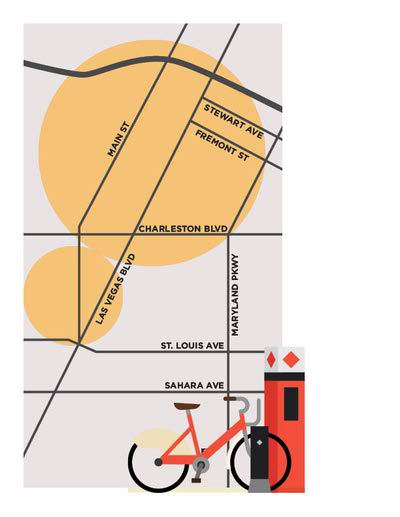Mobility in downtown Las Vegas is about to get easier.
The city will debut a bike-sharing system later this year, giving residents and tourists an option beyond walking, driving, taking a bus, hailing a cab or summoning an Uber or Lyft ride.
The Regional Transportation Commission of Southern Nevada in January awarded a contract to BCycle, a Wisconsin-based company that specializes in bike-sharing systems. RTC officials for three years have discussed bringing a bike-sharing system to Las Vegas, calling it a natural fit with the region’s long-term transportation goals and the city’s demographics.
“You have a certain mix of where people live, work and go to dine or play, all in one area,” said David Swallow, the RTC’s senior director of engineering and technology.
Here’s a look at how the BCycle program will work, according to Swallow and Ron Floth, the RTC’s bicycle and community outreach coordinator.
When will BCycle launch downtown?
The bike-sharing system should be up and running at the end of August.
How does the system work?
Users sign up online or pay at a kiosk at a bike station. Then they choose a bike, go for a ride and return the bike to any BCycle station.
How many bikes will be available?
There will be 180 bikes in the Las Vegas system.
When will the bikes be available?
The bikes should be available for use 24 hours a day, 365 days a year. Other cities restrict bike use based on weather, but Las Vegas’ mild climate should make bike use possible year-round.
Where will the bike stations be?
Eighteen bike stations will be spread across a 1.5-square-mile service area, from the Stratosphere to Stewart Avenue.
A bike station is planned for the Bonneville Transit Center to link RTC bus riders with bikes, but other station locations have not been determined. RTC officials are conducting a survey to gauge where people want stations.
How much does it cost?
An annual membership likely will cost $65 to $85, similar to the rate in other cities. Annual memberships give users unlimited access to bikes for 30-minute trips.
What that means: You can ride a bike longer than 30 minutes, but you would need to check it in and out of another station to reset the clock. If you ride it longer than 30 minutes without checking it in, you will be charged a fee for every additional half hour. The 30-minute rule exists to ensure a steady supply of bikes. So if you’re bicycling to meet a friend for coffee, you should find a nearby station to check in the bicycle while you’re enjoying a cup of joe. RTC officials say the 18 bike stations will be located conveniently across downtown to make this possible.
A day pass likely will cost $6 to $8. Three-day and month-long passes may be available as well, but pricing has not been finalized for any form of rental.
Will the bikes be adjustable?
Yes. The seats adjust to fit people ranging in height from 4 feet, 11 inches to 6 feet, 5 inches.
What will the bikes look like?
Las Vegas will receive BCycle’s 2.0 bikes, which are lighter than the first-generation bikes used in other cities. The bikes feature baskets, headlights, tail lights and a three-speed internal gear hub.
Will helmets be provided?
No, but the RTC may explore providing helmets through a third-party sponsor. Bicyclists are encouraged to bring their own helmets.
Nevada law does not require bicyclists to wear helmets.
What happens if the bike gets stolen?
If a user leaves a bike unattended and it gets stolen, the cost of the bike would be applied to his or her credit card. That’s why users are encouraged to check in bikes at stations near their destinations. The bike stations are secure. BCycle stations in other cities have experienced few incidents of theft.
How much will this system cost taxpayers?
The 180 bikes, 18 stations and back-end support systems will cost about $1 million. A federal grant paid for about 95 percent of the equipment, and the RTC will cover the rest.
Will the BCycle system be expanded to other parts of the valley?
Probably. If the program is successful, the RTC hopes to add more stations downtown and expand the system’s boundaries. Officials also are exploring the feasibility of a bike-sharing system on the UNLV campus.
What other cities have BCycle systems?
Forty-one communities in the United States and South America have BCycle systems, including Denver, Salt Lake City, Houston, Nashville, Charlotte and Cincinnati.


Join the Discussion:
Check this out for a full explanation of our conversion to the LiveFyre commenting system and instructions on how to sign up for an account.
Full comments policy